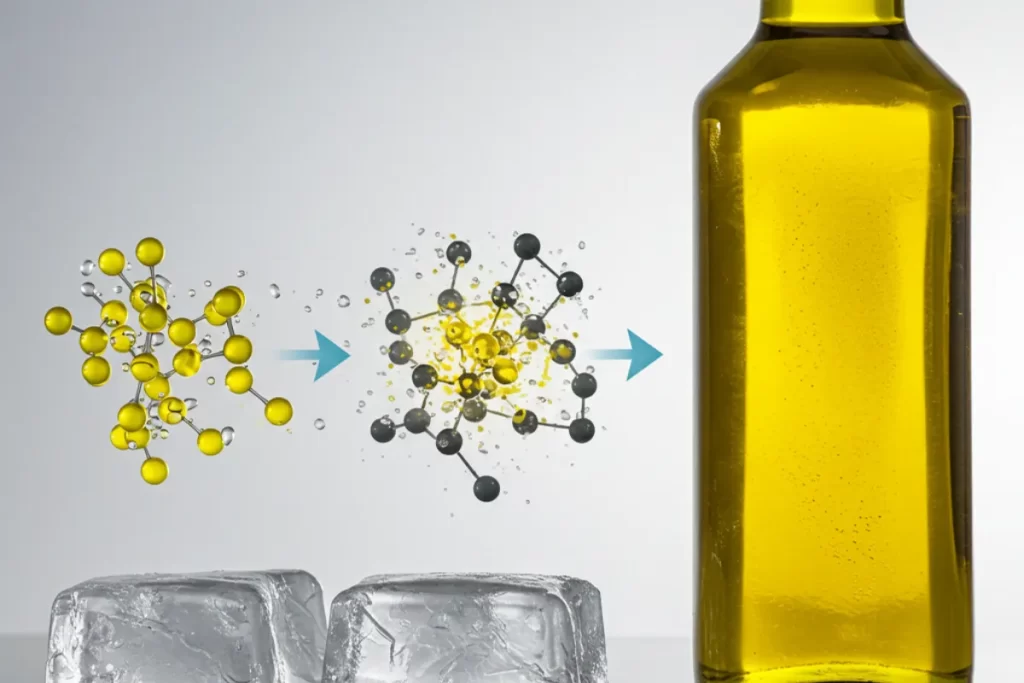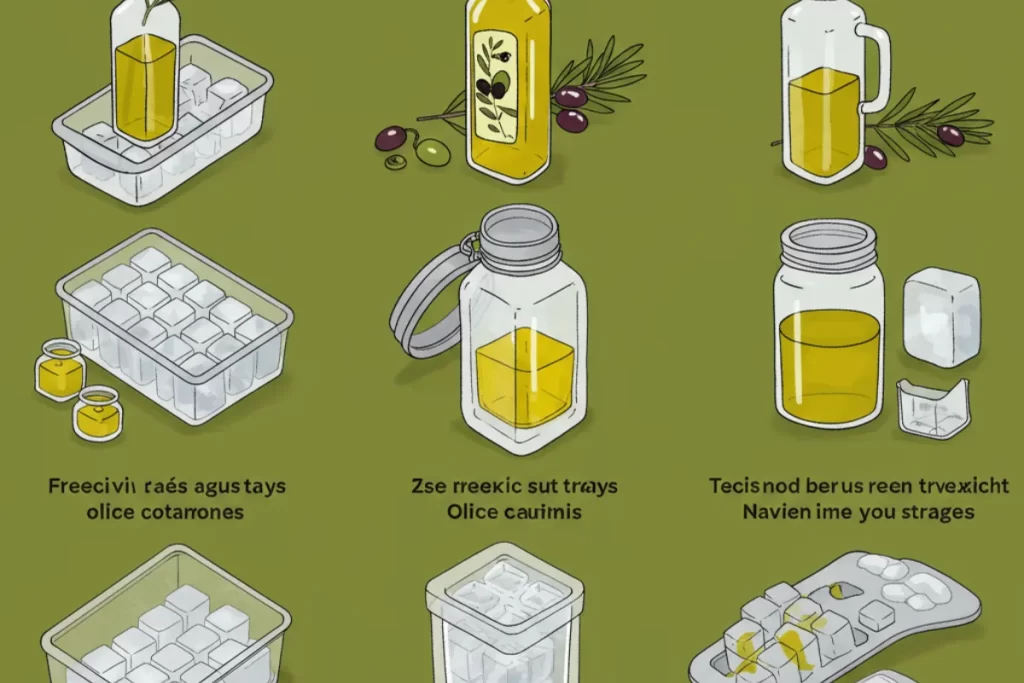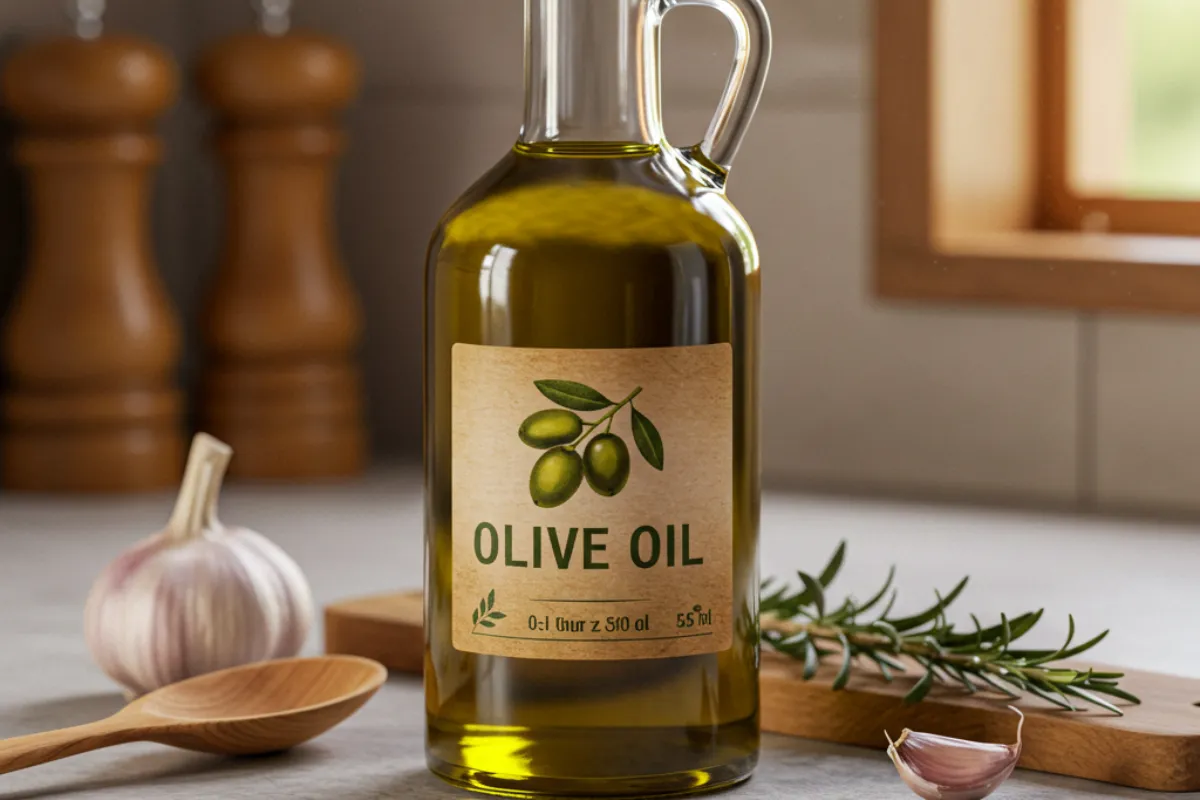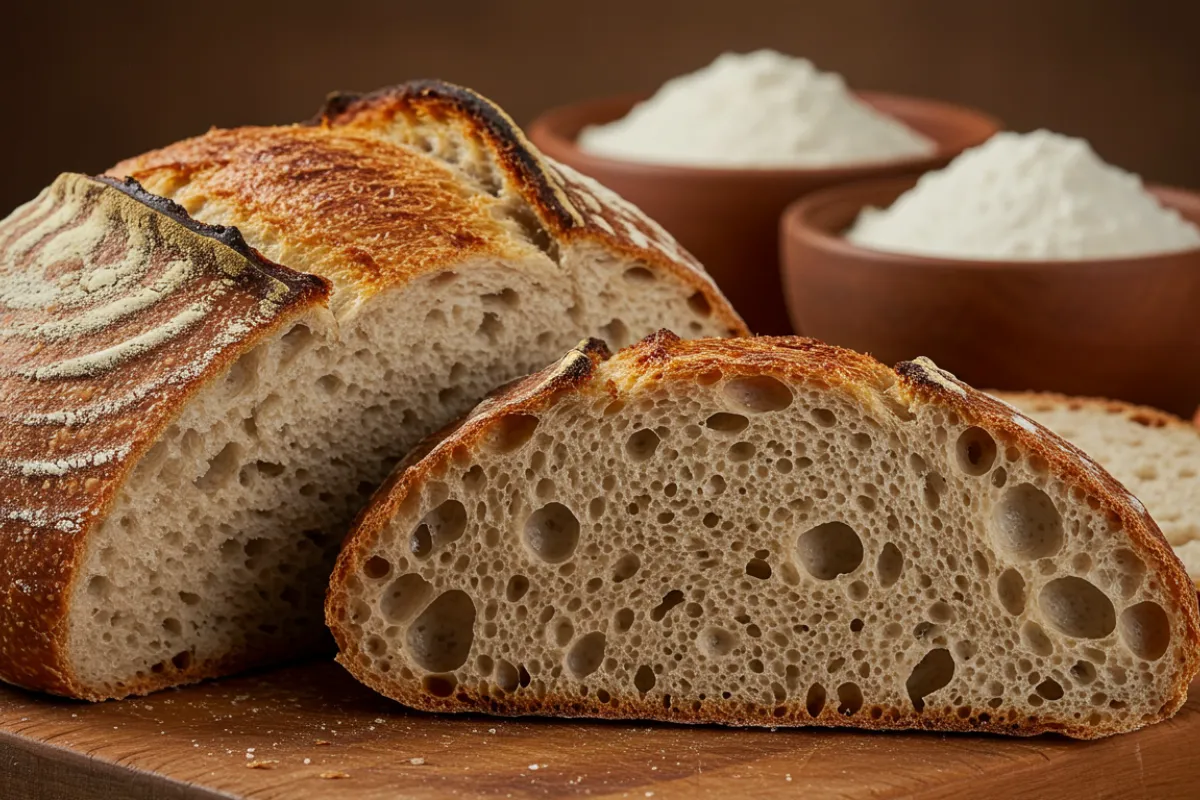Table of Contents
can you freeze olive oil? Olive oil is a staple in many kitchens worldwide, praised for its health benefits and rich flavour. We use it often in cooking, salads, or as a finishing touch to a dish. But what happens if you don’t finish a bottle and want to keep the oil longer? Can you freeze olive oil? This article will cover all you need to know about freezing olive oil. We’ll discuss the effects of freezing, the best methods, and tips to preserve its quality.
What Is Olive Oil?
Olive oil is made by pressing olives, which produces a liquid oil used in cooking. There are many types of olive oil, but extra virgin is the most popular. It has a fresh, fruity flavour and health benefits. Olive oil is made of triglycerides, fatty acids, and natural waxes from the olive skin. Its unique composition affects its behaviour at different temperatures, including freezing.
Can You Freeze Olive Oil?
The simple answer is yes, you can freeze olive oil. However, just because you can freeze doesn’t mean you should store all your olive oil in the freezer. Olive oil freezes at low temperatures, but how it freezes depends on the temperature and its composition.
At refrigerator temperatures (around 40°F), olive oil will cloud and chunk. It won’t freeze completely. This happens because the oil’s fatty acids and triglycerides crystallize at different temperatures. At around 54°F (12°C), olive oil can begin to solidify and become cloudy. The colder it gets, the more likely the oil will form crystals. The oil will become completely solid when placed in a freezer (0°F or lower).
Freezing olive oil doesn’t harm its quality. However, knowing what happens during freezing and how to store it is important.
What Happens When Olive Oil Freezes?

When olive oil is frozen, it undergoes some natural changes. As the temperature drops, the oil’s fatty acids and triglycerides start to crystallize. This results in the oil becoming cloudy and forming crystals or clumps. The natural waxes found in olive skin can also cause the oil to form cloudy droplets or small particles.
Although this process may seem alarming, it doesn’t indicate spoilage or degradation. Freezing olive oil is natural and does not affect its taste, texture, or nutrition. Once thawed, the oil will return to its normal consistency and can be used just as you would fresh olive oil.
Does Freezing Olive Oil Affect Its Quality?
Freezing olive oil does not harm its quality, health, or flavour. That’s the important thing to note. The cloudiness and crystals that form during freezing are natural. They will disappear once the oil is thawed.
Freezing may affect the oil’s appearance. But, it does not change its nutrients. Freezing preserves olive oil if you can’t use it quickly. It prevents the oil from going rancid or oxidising.
Methods for Freezing Olive Oil

If you decide that freezing olive oil is the best method for preserving it, there are a few different ways you can do it. Here are some useful methods for freezing your olive oil:
1. Using Ice Cube Trays
Ice cube trays are one of the easiest and most convenient methods for freezing olive oil. This method works well for small portions of olive oil, which can later be used in cooking or as a dressing. Pour the olive oil into the compartments of an ice cube tray and place it in the freezer. Once the oil is frozen into cubes, you can transfer the cubes to a sealed bag or container for long-term storage. This is useful if you want to freeze small amounts of oil. It’s for recipes for just a tablespoon or two of olive oil.
2. Using Silicone Molds
Silicone moulds are an excellent choice if you want to freeze olive oil more flexibly. They allow you to portion the oil into shapes that are easy to use in cooking. Like the ice cube tray method, you can freeze olive oil with herbs in the mould for added flavour when cooking. Chop your herbs, mix them with olive oil, and freeze them in the mould.
3. Freezing Olive Oil in Small Bottles or Containers
If you prefer to freeze large amounts of olive oil, use small bottles or containers. Make sure that the containers are air-tight and freezer-safe. Pour the olive oil into the container, leaving room for expansion as the oil freezes. Store the container in the freezer until you need it.
Tips for Freezing Olive Oil
- Store at the Right Temperature: Olive oil should be stored at around 0°F or lower. This will ensure it freezes properly. However, olive oil won’t freeze at a regular fridge’s (40°F) temperatures. To achieve a solid freeze, a freezer set to 0°F is ideal.
- Use Smaller Containers: Freeze olive oil in small amounts. This makes it easier to use when you need it, helps prevent waste, and ensures you don’t have to thaw large amounts of oil at once.
- Don’t Overfill the Container: When freezing, leave some space at the top of the container or tray. This allows the oil to expand as it freezes.
- Label the Containers: Date each container if you’re freezing different olive oils. This will help you track how long it’s been in the freezer.
How to Thaw Frozen Olive Oil

Thawing frozen olive oil is a simple process. It’s important not to rush the thawing process or expose the oil to high temperatures. Here are a few tips for safely thawing frozen olive oil:
1. Thaw at Room Temperature
Allow the oil to thaw slowly at room temperature. This will help it return to its normal consistency, which will not affect its flavor or texture. Do not microwave or stovetop the olive oil to thaw it, as this can degrade the oil.
2. Warm Water Method
Place the container in warm water if you need the olive oil to thaw more quickly. Do this gently to avoid overheating the oil. Once the oil reaches room temperature, it will return to its usual liquid state.
Also Read: Can You Freeze Prime Rib? Preserve Rib Roast in a Freezer
Common Misconceptions About Freezing Olive Oil
There are several myths about freezing olive oil that need clarification. Let’s debunk some of the most common misconceptions:
- Myth 1: Freezing Olive Oil Can Determine Its Quality. Some believe that how olive oil freezes can show if it is high-quality, like extra virgin olive oil. However, this is not true. Olive oil’s freezing behaviour depends on its composition. Different oils freeze differently.
- Myth 2: Olive Oil That Hardens in the Refrigerator is Saturated. Olive oil is not a saturated fat. Its hardening in the fridge is due to wax from the olive skin. This has nothing to do with it being unhealthy or overly saturated.
Also Read: Can You Freeze Lox? Tips to Freeze Smoked Salmon & Fish
Final Thoughts
Freezing olive oil keeps it fresh. You can then use it anytime without it going bad. The cloudiness and crystals that form when olive oil freezes are natural and won’t affect the oil’s quality. Once thawed, olive oil returns to its normal consistency, and you can use it just like fresh olive oil.
Following the tips above, you can extend your olive oil’s shelf life. It will then be ready for cooking, dressing, and other uses. You can freeze your olive oil in small portions or with herbs for added flavour. You’ll enjoy this healthy, versatile oil for months.
Can you freeze olive oil? Absolutely! It’s a great way to keep your oil fresh and ensure you have it whenever you need it.




